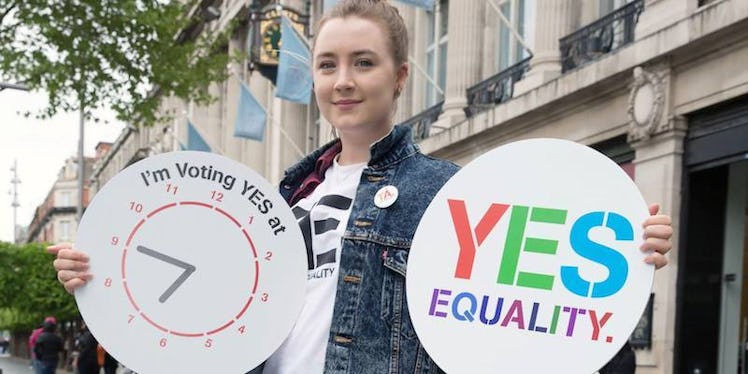
Ireland's Use Of Popular Vote For Same-Sex Marriage Is Revolutionary
On May 22, Irish citizens will have the opportunity to vote on a referendum that can legalize same-sex marriage throughout the country. Approval of this would make Ireland the first nation to put same-sex legislation into law by popular vote.
Ireland's Catholic roots have played a considerable factor in the political climate of the nation. Historically, Irish Catholics have valued traditional views on marriage. However, this weekend could reveal a change in the Irish perspective.
A "yes" on this referendum can also have global implications on other conservative Catholic nations. In nations such as Poland, Italy and Mexico, same-sex marriage is currently illegal.
These countries all face the same challenges Ireland does considering the high percentage of Catholics in these nations. If Ireland changes its marriage laws, we may begin to see changes reflected in these other countries as well.
Although not all Catholics are against same-sex marriage, the Catholic Church officially opposes any change to the definition of marriage.
The Catholic religion believes that marriage is a sacred institution between one man and one woman.
U2 singer Bono urges us all to realize that the word "marriage" has evolved over time, and society should honor that. He explains,
Marriage is now an idea that transcends religion. It is owned by the people. They can decide. It is not a religious institution. As far as I know, Jesus wasn't a married man and neither are most priests [who are] talking about it.
According to a recent poll, 67 percent of people support the introduction of same-sex marriage to Ireland. However, these results vary based on generation.
Not surprisingly, the vast majority of young adults are in favor of the referendum passing. This doesn't necessarily mean that young people reject Catholicism, but it could mean they interpret the religion differently.
Ninety percent of 18- to 35-year-olds plan to vote "yes," but only 55 percent plan to actually show up to cast their ballot. Come on, Millennials!
The lower voter turnout makes it more likely the fate of this election will lie in the hands of elder populations. For Irish citizens 65 and up, only about 55 percent support the same-sex referendum.
To help bridge the generational gap on this issue, Trinity College Dublin Students' Union started the #RingYourGranny for Marriage Equality campaign. The campaign encouraged students to call their grandparents and encourage them to vote "yes" on the upcoming vote.
It makes sense why there would be such a generational divide on this topic when you understand Ireland's history. Considering homosexuality wasn't decriminalized in Ireland until 1993, the nation has swiftly adopted a progressive opinion on this topic. Civil partnerships were not introduced until 2010.
This means the homosexual Irish citizens who are older than 25 lived during a time when being gay was a crime. Although they may soon have the right to marry, it doesn't cover up all of the emotional pain they have had to endure up until this point.
Ursula Halligan, a 54-year-old Irish political correspondent, wrote:
Emotionally, I have been in a prison since the age of 17; a prison where I lived a half-life, repressing an essential part of my humanity, the expression of my deepest self; my instinct to love.
Same-sex marriage has entered the political arena for several decades now, and it's becoming more evident the desire to achieve marriage equality is about more than receiving a wedding license.
It's about being able to express a part of our identities that connects our heart and soul.
If Ireland votes "yes", it will become the fourteenth country in Europe out of the nineteen that have legalized same-sex marriage. The ballot boxes for this case will be open this weekend and results will be shared at the Dublin Castle.
Citations: Young back marriage equality but less keen on voting report (The Irish Times), Ireland Same Sex Marriage Referendum Sets Government Against Church (NBC), Catholic soul searching in Ireland over vote on gay marriage (CTV News)